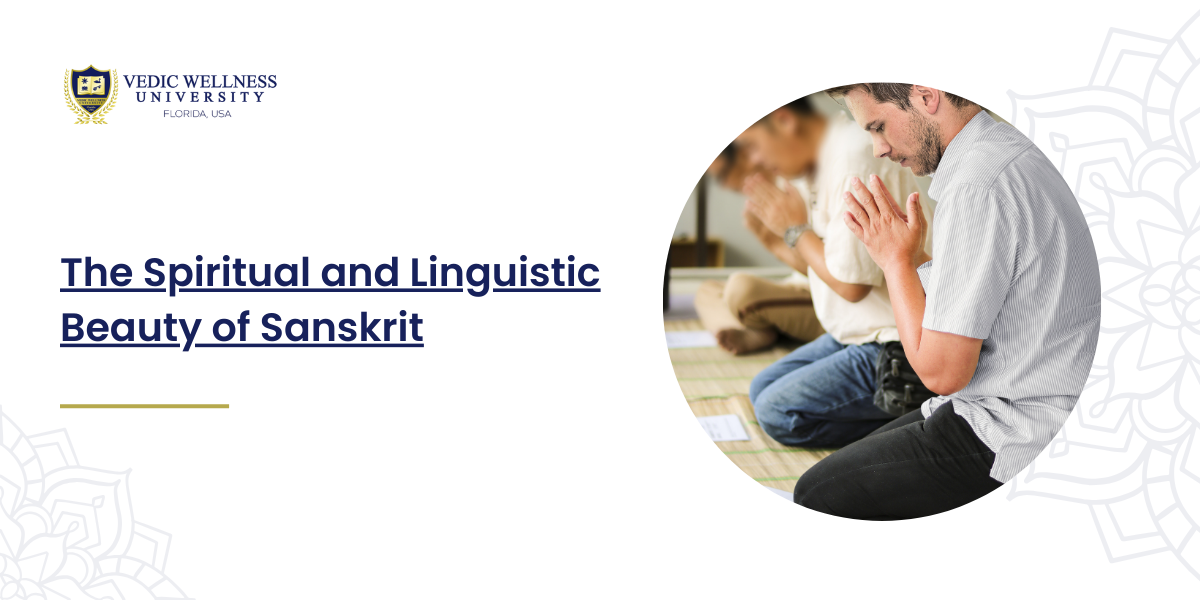शब्दब्रह्मा विभाजनं नास्ति
(Shabda Brahma Vibhajanam Naasti)
“The word is Brahman, undivided and whole.” – Rig Ved
Introduction
Sanskrit, often referred to as the language of the gods, holds a sacred place in the heart of ancient Indian philosophy, spirituality, and education. Its profound beauty lies not only in its rich vocabulary and linguistic structure but also in its spiritual depth and the meditative practices it inspires. As the foundational language of the Vedas, Upanishads, and countless other sacred texts, Sanskrit is the cornerstone of traditional education in India and, increasingly, around the world.
The relevance of Sanskrit has been reinvigorated today as more and more people globally are realizing the depth of spiritual teachings, linguistic beauty, and cultural wisdom embedded in this ancient language. By offering Sanskrit courses, institutions like Vedic Wellness University aim to keep this ancient wisdom alive and accessible. This blog explores the spiritual and linguistic beauty of Sanskrit, emphasizing its global appeal and relevance in modern times.
The Foundations of Sanskrit: Linguistic Beauty and Spiritual Depth
The essence of Sanskrit lies in its meticulous structure and profound spiritual teachings. A verse from the Bhagavad Gita aptly summarizes the spiritual potency of the language:
ध्यानेनात्मनि पश्यन्ति केचिदात्मानमात्मना।
(Dhyanenatmani Pashyanti Kechidatmanam Atmana)
“Some perceive the Self within themselves through meditation.” – Bhagavad Gita 13.25
The linguistic beauty of Sanskrit is unparalleled. It is a language that transcends mere communication; it is a tool for spiritual enlightenment. The phonetic perfection and grammatical precision of Sanskrit have a unique impact on the mind and soul, creating an environment conducive to meditative practices. Every word in Sanskrit is believed to carry a vibrational essence that resonates with the cosmic consciousness, enhancing one’s spiritual journey.
Meditative Practices Through Sanskrit Chanting
One of the unique aspects of Sanskrit is its use in meditative practices. Chanting Sanskrit verses or mantras can serve as a powerful tool for meditation. The rhythmic pattern of Sanskrit poetry, coupled with its phonetic structure, allows individuals to attain higher states of consciousness. Unlike modern languages, which primarily focus on semantics, the sound vibrations in Sanskrit are said to have healing and calming effects, making it ideal for spiritual and meditative practices.
The Role of Traditional Education in Preserving Sanskrit
Traditional education systems, especially those rooted in Vedic practices, have always emphasized the study of Sanskrit. Institutions like the Vedic Wellness University play a crucial role in promoting Sanskrit courses as part of a broader curriculum that integrates both ancient wisdom and contemporary relevance. Students from around the globe are now exploring Sanskrit not only to learn a language but also to delve into the philosophical, spiritual, and cultural treasures it holds.
The Spiritual Teachings and Philosophical Essence of Sanskrit
Sanskrit is not just a language but a profound repository of spiritual teachings. The Vedas, Upanishads, and Puranas, all written in Sanskrit, contain the essence of Indian spiritual philosophy. These texts encompass various dimensions of existence, from the physical to the metaphysical, providing a comprehensive understanding of life and the universe.

असतो मा सद्गमय, तमसो मा ज्योतिर्गमय, मृत्योर्मामृतं गमय।
(Asato Ma Sadgamaya, Tamaso Ma Jyotirgamaya, Mrityor Maamritam Gamaya)
“Lead me from the unreal to the real, from darkness to light, from death to immortality.” – Brihadaranyaka Upanishad 1.3.28
Categorization of Sanskrit Literature
The vast body of Sanskrit literature is broadly categorized into two types: Shruti (that which is heard) and Smriti (that which is remembered).
- Shruti Texts: These include the Vedas, Brahmanas, Aranyakas, and Upanishads. They are considered the primary scriptures of Hinduism, conveying spiritual teachings and meditative practices. The Vedic texts, for instance, are not just religious manuals but are also treasure troves of linguistic beauty and spiritual wisdom.
- Smriti Texts: These include the Mahabharata, Ramayana, and various Puranas. Smriti texts are secondary scriptures that explain and elaborate on the principles found in Shruti. The Mahabharata and Ramayana, both epic poems, are celebrated for their intricate narratives, poetic richness, and moral and spiritual teachings.
The Significance of Sanskrit Poetry
Sanskrit poetry, known for its rich imagery and metaphorical depth, captures the spiritual essence of human existence. Poets like Kalidasa and Bhartrihari have contributed immensely to the tradition of Sanskrit literature, blending linguistic beauty with profound philosophical insights. Sanskrit poetry is not just an art form; it is a spiritual experience that engages the reader’s mind, soul, and emotions.
- Kalidasa’s Meghaduta is an excellent example of how Sanskrit poetry combines natural beauty with spiritual longing. The poem is a message sent by a love-stricken Yaksha to his distant wife via a cloud. The verses not only paint a vivid picture of nature but also evoke deep emotional and spiritual responses.
Vedic Wellness University: Promoting Sanskrit and Traditional Education
Vedic Wellness University stands at the forefront of promoting traditional education that integrates ancient Vedic wisdom with modern learning methodologies. The university offers a variety of Sanskrit courses that cater to students from all backgrounds, ranging from beginners to advanced scholars.

Courses Offered at Vedic Wellness University
- Diploma in Sanskrit Studies: This course provides a comprehensive introduction to Sanskrit, including its grammar, poetry, and spiritual teachings. It is ideal for beginners who wish to grasp the basics of the language and its cultural context.
- Graduate and Postgraduate Programs: These programs delve deeper into the linguistic beauty of Sanskrit, its role in meditative practices, and its spiritual teachings. Students can specialize in areas like Vedic Studies, Sanskrit Poetry, and Ancient Indian Philosophy.
- PhD in Sanskrit and Vedic Studies: This program is designed for advanced learners who wish to conduct in-depth research on specific aspects of Sanskrit literature, linguistics, or philosophy.
- Associate Program: The university also offers an associate program where other institutes can partner with Vedic Wellness University to offer Sanskrit courses and share in the dissemination of this ancient wisdom.
By offering these diverse programs, Vedic Wellness University ensures that the rich legacy of Sanskrit and its associated spiritual teachings continue to inspire and enlighten future generations.
Conclusion
Sanskrit, with its profound linguistic beauty and spiritual teachings, is much more than a language—it is a path to self-realization and inner peace. As global interest in traditional education, meditative practices, and spiritual teachings continues to grow, the relevance of Sanskrit becomes even more apparent. Institutions like Vedic Wellness University are playing a vital role in keeping this ancient language alive, ensuring that its wisdom and beauty are accessible to all who seek it.
For those interested in exploring the depth of Sanskrit, the courses offered by Vedic Wellness University provide a unique opportunity to engage with this sacred language in a holistic and meaningful way. Through dedicated study and practice, one can truly appreciate the spiritual and linguistic beauty of Sanskrit, gaining insights that transcend time and culture.
By nurturing the soul through words that resonate with divine energy, Sanskrit invites us all to embark on a journey of spiritual discovery and intellectual enrichment.


